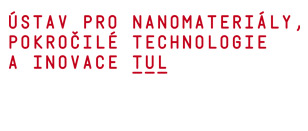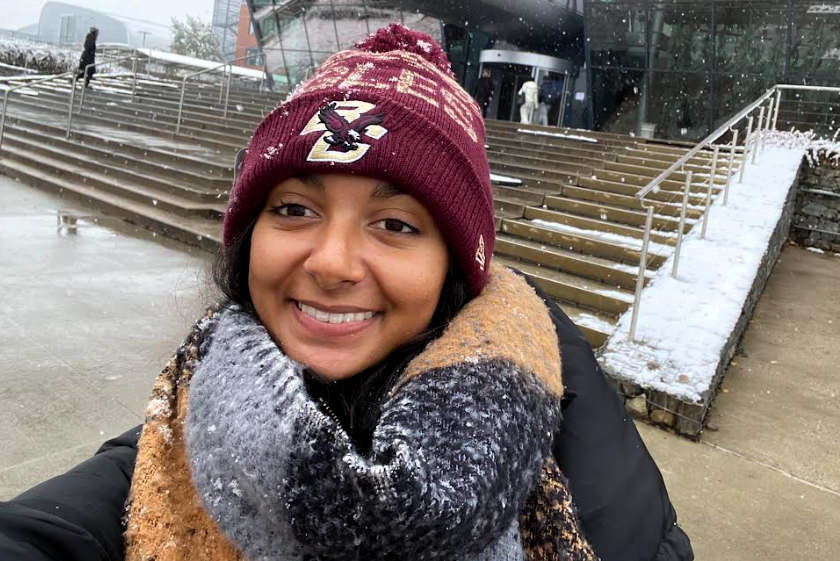
Her passion for the prevention and treatment of infectious diseases started during the COVID-19 pandemic. At that time, Fizah studied COVID-19, and she took classes on immunology and vaccinology. After learning about the recent quiet resurgence of syphilis, she has been determined to contribute to the prevention of this ailment with her research. After her Fulbright experience in the Czech Republic, she plans to attend medical school and become a medical practitioner focusing on infectious diseases.
This interview is the 30th part of our Fulbright series to celebrate 30 years of the Fulbright Program in the Czech Republic. Interviews are conducted in cooperation with Ladislav Loukota from Vědátor platform. Video recordings of all the live interviews are published on our Facebook page on the first Wednesday of every month, and are available on our YouTube channel. On Fridays, we offer a written version of the interview on our blog.
How close are we today to vaccines on syphilis-causing bacteria? Why is this research important when we can effectively combat syphilis using antibiotics?
Syphilis in modern society is often thought of as a disease of the past. It is commonly conceived as something of history that we have treated for good with antibiotics. This was true until about 15-20 years ago. We started to see a rise of syphilis all over the world despite the use of antibiotics. There are a few reasons for that. Firstly, there has been some antibiotic resistance that has developed with the bacteria, making antibiotics ineffective. Secondly, there is very little education about syphilis and preventative measures that can be taken against it, so people are getting syphilis and not realizing it since they are unable to recognize the symptoms. This highlights the need for a syphilis vaccine as a preventative measure against the antibiotic-resistant bacteria and to prevent syphilis transmission in general. There is still a lot of work to be done in the field before we are able to have an effective global syphilis vaccine, but I am hoping that my research is able to shed light on the targets that should be used in a vaccine.
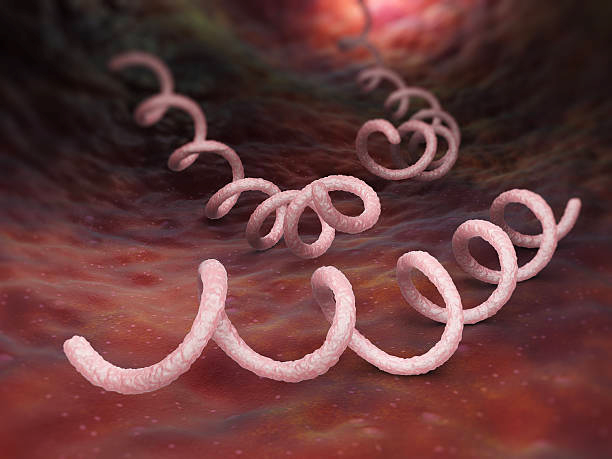
Syphilis bacteria, Fall 2023.
Why is the syphilis vaccine so complicated that we still don't have the vaccination? What are the challenges of this disease?
One big handicap is that the cultivation of the syphilis bacteria is extremely difficult in vitro. The bacteria has only been successfully cultivated over a long period of time in a couple labs in the world, our lab being one of them, because of the difficulty of the process. In vitro treponema cultivation is necessary to study the outer membrane proteins that would be necessary to study for a vaccine. The difficulty of cultivating syphilis in vitro has hindered a lot of advancement in the field, and I believe that because it is widely accepted to be a disease of the past, not much attention is given to this disease.
In what way are you contributing to the research of the vaccine? Why do you think we have a shot at vaccines today, given its lengthy development?
In my research, I will be first studying the differences in proteins in various strains of syphilis that have been found globally. This will help me to get an idea of the structural differences between the strains that confer functional differences. I will then hopefully be able to characterize the proteins of the syphilis antigen to determine which proteins are responsible for antibody linkage and therefore would be a successful candidate for a vaccine target.
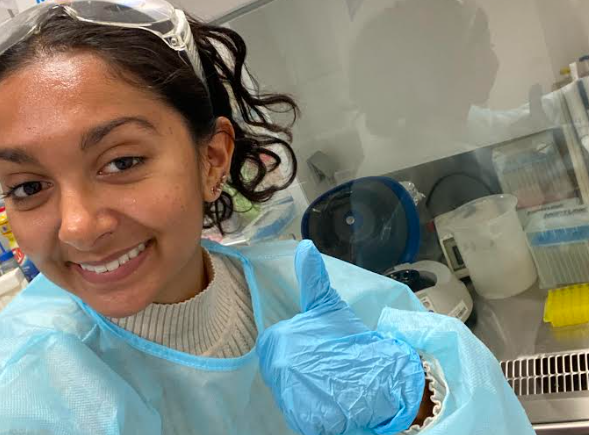
Fizah at her lab, Masaryk University in Brno, Fall 2023.
Why did you choose this particular topic of your research, and of your career?
I have a few years of research experience in infectious diseases and I find this topic particularly interesting after we have all witnessed the massive effects a pandemic can have on society. The covid-19 pandemic prompted me to start asking questions about the scientific nature of infectious disease and the social and public health effects it has had on our world. I joined a lab to study covid-19 and took classes specifically studying vaccines and immunity. This is where I learned about the comeback of syphilis and the hindrances to a vaccine. Because this is a dangerous disease that is often left out of mainstream scientific conversations, I decided I wanted to contribute to this cause. I am planning on attending medical school in the States next year and am strongly considering becoming an infectious disease specialist. I hope to not only practice medicine but be involved in clinical research and global health policy related to infectious disease. I believe this research will give me a strong understanding of the scientific nature and public health effects of syphilis that I can use to inform further research and clinical work in my future career.
What brought you to the Czech Republic for your stay? How has your experience been so far studying at Masaryk University?
I really wanted to get an authentic experience in the heart of Europe for my Fulbright. When I was trying to find a lab that would support research aligned with my interests, my lab at Masaryk University really stood out in terms of the facilities and opportunities but also in terms of the location and culture. I have been lucky enough to have traveled a lot growing up, but I have never experienced Czech life. I wanted to try something new and push myself out of my comfort zone. I heard that the Czech Republic is a hidden gem of Europe with beautiful sights and a rich history which has really proven to be true. So far, I have also had a very positive experience at Masaryk University. My lab professor Dr. Šmajs is incredibly helpful, supportive, and always available to help me learn. I have been really lucky to have such great PhD and Masters students that have been able to guide me and inspire me to think of new solutions to our problems. There is great flexibility with my opportunities here, and I feel it is comforting to know that science is so universal across the world.
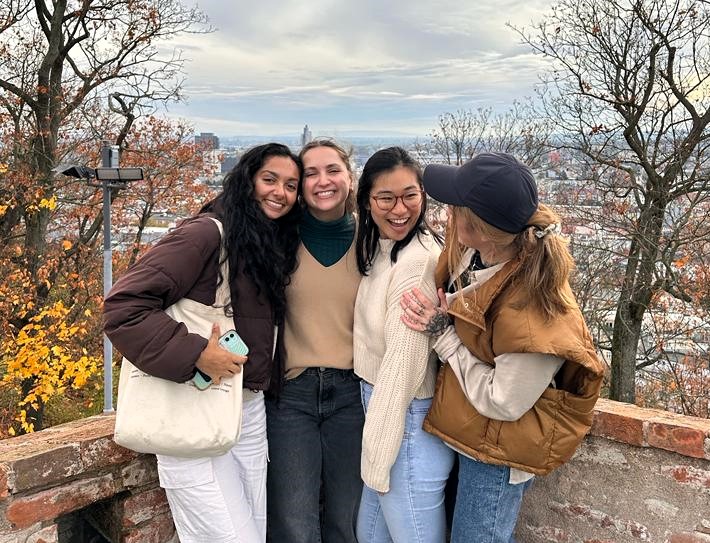
Fizah and her friends and Fulbright colleagues Rachel, Jasmine and Zoe, October 2023, Brno.
Are there any specific aspects of the academic environment or research facilities that have stood out to you during your short study visit in the Czech Republic?
There are many differences between the Czech and American academic environments. The academic track is structurally different here, but many aspects remain the same. The research facilities are cutting-edge at Masaryk and they are highly efficient labs, similar to ones I worked in in the United States. The lab environment is very collaborative and the other researchers view everyone as part of the team trying to find answers together, so they see helping one another not as a burden but as a necessary element of the field.

Fizah talks to Ambassador Bijan Sabet and his wife Lauren at the welcome reception for new Fulbright grantees at the residence of the U. S. Ambassador in Prague, September 2023.
In terms of cultural differences, what aspects of daily life or academic practices have you found distinct between your experience in the United States and your current stay in the Czech Republic?
I would say there isn’t this flagrant “culture shock” that everyone likes to use, but more subtle cultural nuances. There are little things that are different in everyday life. Firstly, the demeanor of the people is different than in America. Czech people, while not as warm when first meeting you, are very generous and welcoming when you get to know them. Also, it is a much less religious society than what I am used to in the US. There is a more relaxed work atmosphere and it seems like people get more free time to have a life outside of work. There are random differences also like the way you seat yourself at restaurants instead of being seated and there is a stigma against speaking loudly on public transportation which I had to quickly learn. The difficult language has been one of the trickiest parts, but luckily in most parts of the city I can get by with my minimal Czech knowledge. I have had the amazing opportunity of learning about Czech traditions and holiday celebrations through conversations during English lessons I teach a couple times a week after work. I learned about the differences in Halloween, Christmas, and New Year's celebrations and they taught me about historic cultural traditions like “hody” and St. Martin’s festival.
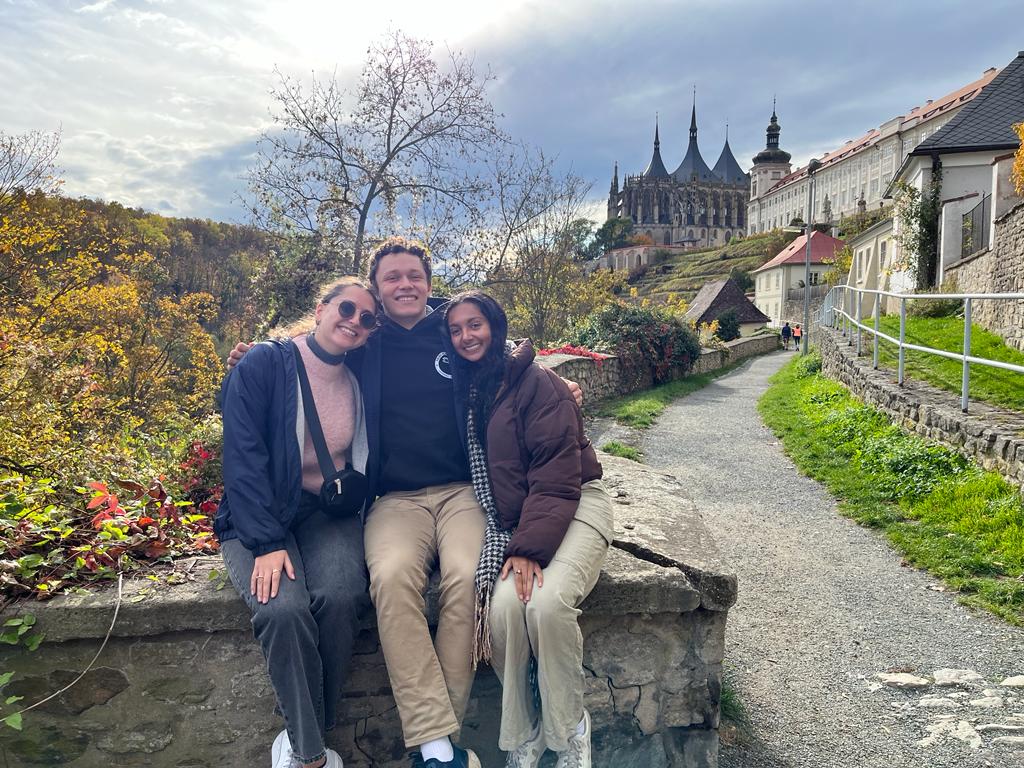
Fizah explores the Czech Republic with Fulbrighters Rachel and Rafael, November 2023, Kutná Hora.
Have you had the opportunity to collaborate with Czech researchers or students during your visit, and if so, how has that collaboration enhanced your research on syphilis-causing bacteria?
Yes, I collaborate all the time in the lab. I am constantly asking the PhD students and professors questions about their research, their ideas on my research, and where we can move forward in the field. I would not be able to do the research I am doing without their guidance and expertise, and being able to talk through ideas with others in my lab has been integral to any progress. They are very eager to hear about the way science is done in the US and I am very interested in seeing how they proceed differently here. Language or cultural barriers do not hinder our ability to work together towards scientific progress.
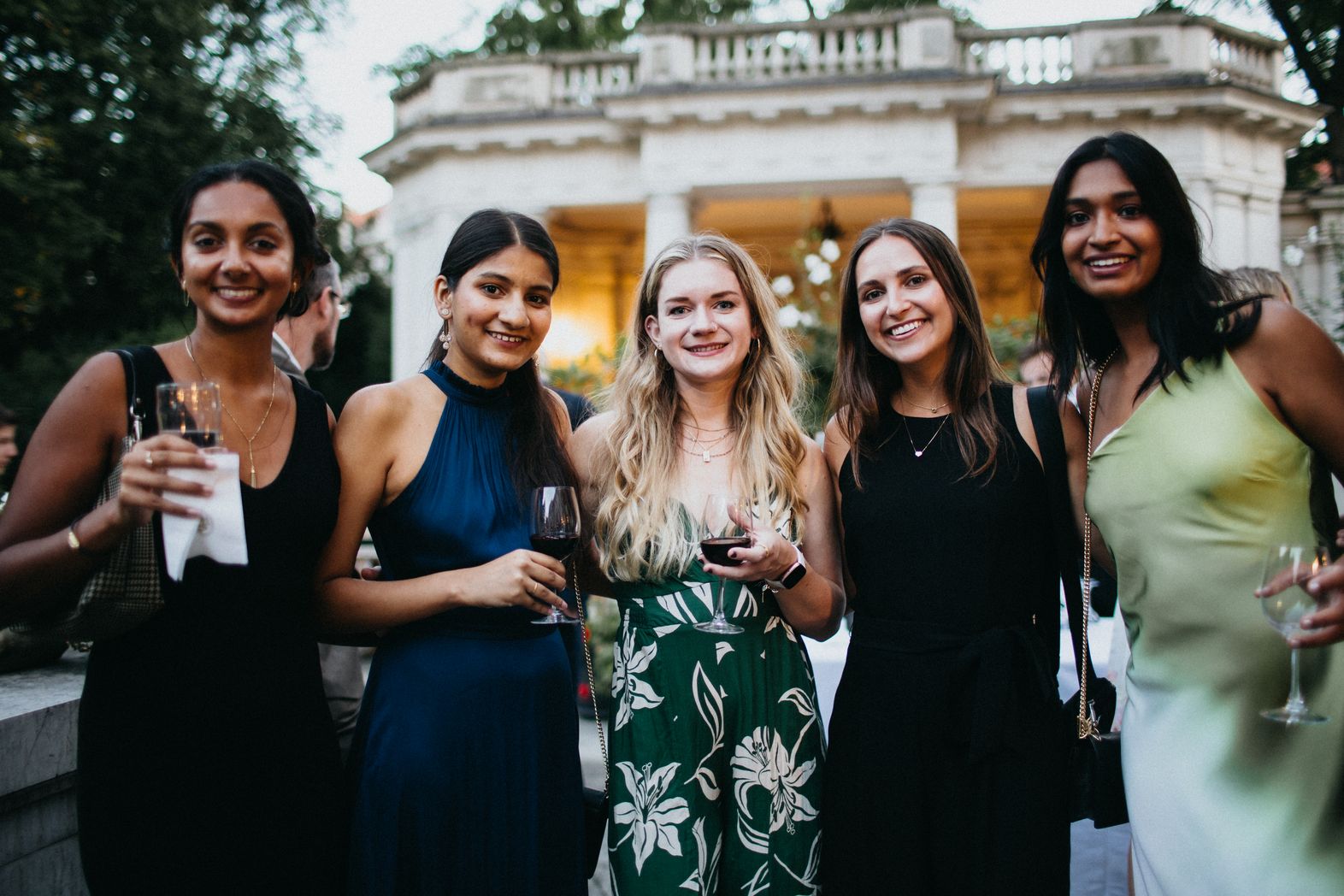
Fizah and English Teaching Assistants Bromina, Autumn, Rachel and Aditi at the welcome reception for new Fulbright grantees at the residence of the U. S. Ambassador in Prague, September 2023.
And finally our traditional last question - what is the one thing you consider to be the most important about your research or topic, but most people are not aware of it?
I would say that we need to emphasize education and prevention when it comes to syphilis. It is not something that is discussed or taught usually, but it is clearly a public health threat that needs to be taken seriously. More babies are being born with syphilis and suffering from birth defects everyday. We need to learn how to take preventative measures against STDs, learn the symptoms, and know our options for treatment. My team and teams across the world are working very hard to understand the bacteria better, but other preventative measures like education and awareness need to be taken in conjunction with the potential vaccine given its challenges. This is an easily preventable and treatable disease if only the public had more access to resources regarding syphilis, so we all need to work our hardest to prevent these unnecessary tragedies.
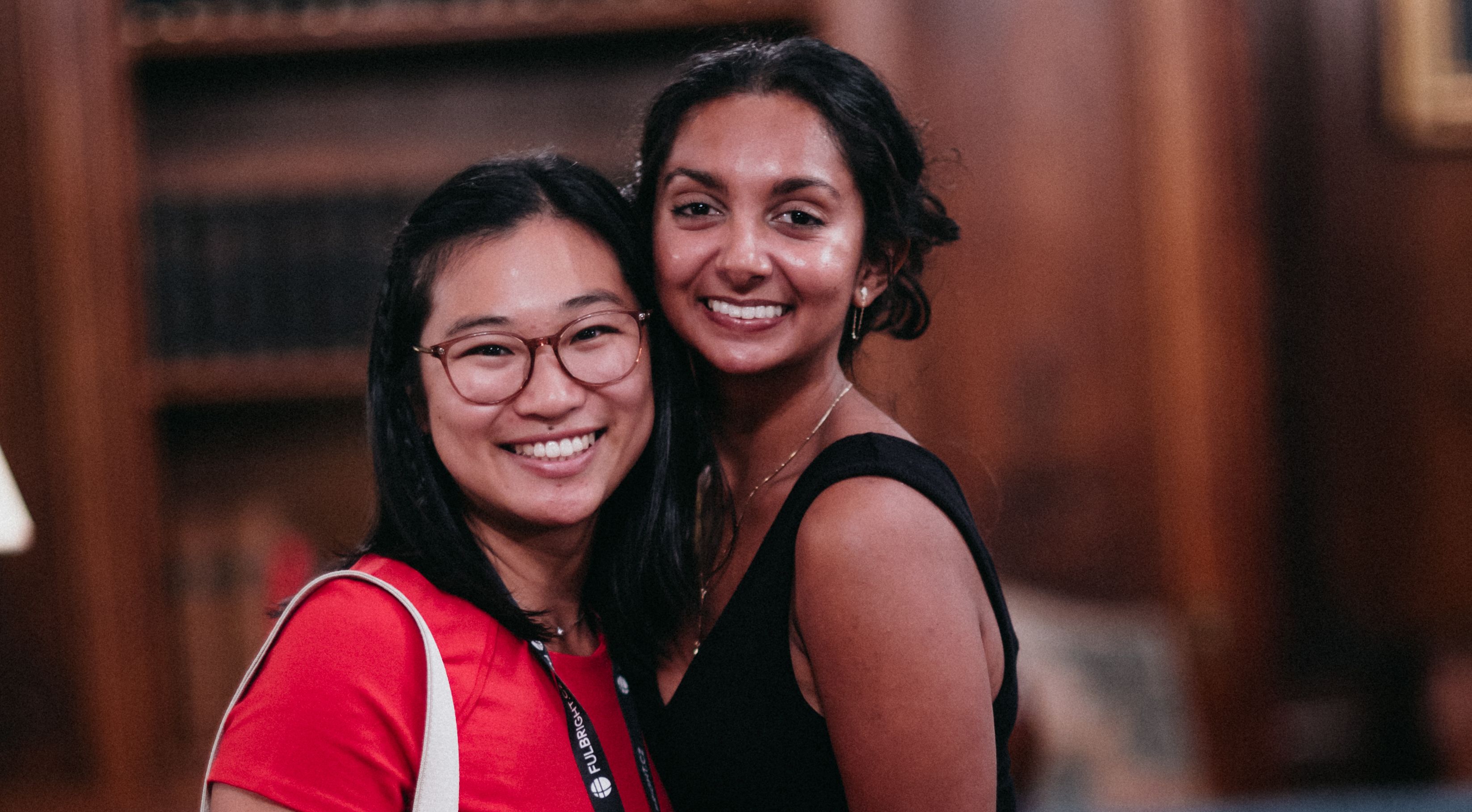
Fizah with her dear friend and fellow Fulbrighter Jasmine Su, September 2023, Prague.
Zdroj: Komise J. Williama Fulbrighta
Článek vyšel v lednu 2024 na blogu Fulbrightovy komise.























